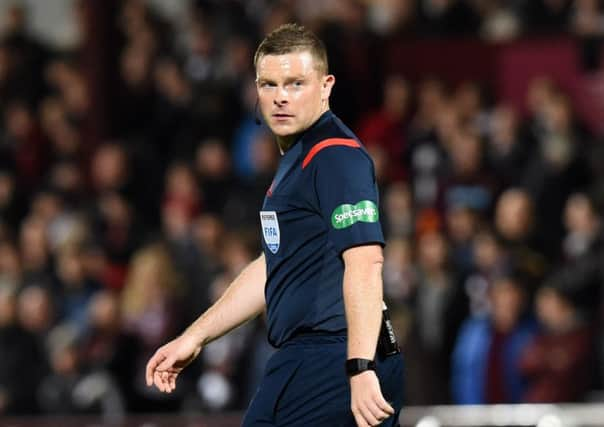Moira Gordon: Referee stirred Tynecastle emotions


But, even without anything worthy of a raucous response being produced on the pitch for much of the match, there was no doubting the old Tynecastle arena still pulsed. If the football struggled to breathe life into proceedings, officialdom could always be counted on in that respect. The last time referee John Beaton set foot in Gorgie, earlier this month, he produced arguably one of the poorest refereeing performances of the season, and possibly of the past few campaigns. In the minds of the Hearts fans it earned him the kind of hostility and lasting infamy usually reserved for the likes of Willie Collum in these parts. Well, Collum and Leigh Griffiths.
Last night both Beaton and the Celtic striker did nothing to ingratiate themselves to their hosts. With another inconsistent display, which infuriated both sets of supporters and many neutrals, the referee single-handedly amped up the volume time and again as the anguished appeals from players and the technical areas stirred the emotions in the stands and forced the fourth official into more prolonged periods of debate with Hearts boss Robbie Neilson than the guy clearly wanted. At least the red card which seemed inevitable at one stage failed to appear.
Advertisement
Hide AdAdvertisement
Hide AdThat was nothing compared to the frenzied response to Griffiths’ goal and antagonistic celebrations, running away from the away support to goad the home punters. His own fans forgave him, the Hearts contingent didn’t and, for once, they found an ally in the referee, who booked him as a consequence.
Until then, the volume wasn’t ear-piercing but there was an air of anticipation, a palpable tension. There was no way this fixture would conjure up anything less. Despite recent history and the one-sided nature of head to heads here suggesting otherwise, there was the promise of a tight and competitive contest. The league leaders, up against the team occupying third, there was more than a 90 minute cup tie at stake. Hearts are a team harbouring grievances. On the park they were seeking revenge for the maulings suffered here in the last few seasons and for the miscarriages of justice they believe were perpetrated in those fixtures.
A team bonded by that belief that they have been hard done by and by trips to Nandos, they had hoped that unity could be a factor, especially up against a team that seems to be fractured, bruised and bloodied by negative headlines. While Hearts extol the virtues of their manager, Celtic were embarrassed by the unseemly squabbling between one of their star players and their management team. That increased the pressure on manager Ronny Deila. The response was significant, though. The hammering of Dundee United had taken some of the heat off until a training ground fracas, switched the spotlight back on Deila’s side.
Emilio Izaguirre’s stitched-up ear was a reminder of the boot to the head dished out by his team-mate Nadir Ciftci. But, after Griffiths came off with Celtic two goals up, there was a flash of harmony. As if to underline that the bust-up had been something and nothing, Ciftci joined the fray and the temper tantrums seen in Molde were replaced by Griffiths swapping laughs and handshakes with his boss before getting an arm around the shoulder from assistant John Collins.
Winning games doesn’t cure all ills, but it certainly helps.